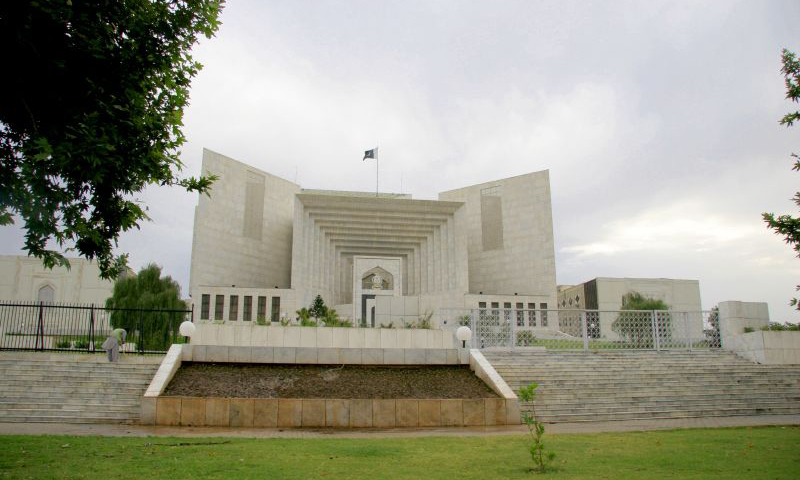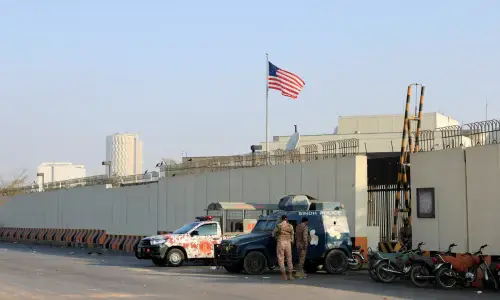THE original jurisdiction of the Supreme Court, of which suo motu proceedings are a variant, is limited by the Constitution to the “enforcement of fundamental rights” for a “question of public importance”.
Around a decade ago, Karachi was a cesspit. The MQM and ANP were warring over turf. The PPP had entered the fight by arming gangsters based out of Lyari. With the city facing a governance vacuum, it was ripe for a trial by Chaudhry. The Supreme Court took suo motu notice. Orders would be fired across the board, officers would be suspended, the police would quake in their shoes before the might of Iftikhar Chaudhry’s justice.
It was doubly beneficial for Chaudhry and his backers to take on the Sindh government. It was hitting the weak ruling PPP where it hurt, in its bread basket of Sindh. A summary of Supreme Court activism in Sindh shows vast intrusion into government functions. There has been a ban on public land transfers in the province by the court for nearly a decade on the premise that the entire bureaucracy is corrupt. The entire civil structure hierarchy of Sindh’s bureaucracy was upended by the court for the crime of promoting and positioning candidates of their choosing. Through a grossly expanded reading of the Federal Legislative List, Sindh was told its well-curated hospitals belonged to the federation, which doesn’t know what to do with them.
In the process of what seemed to be Mission Get PPP, provincial supremacy stands eroded to a point where it is at odds with the plain meaning of the Constitution. People continue to suffer from a governance vacuum which activist judges set out to fix, and the PPP is under added pressure. Rather than fighting back on the political and public front, it perhaps looks towards dealing with the supposed original backers of Mission Independent Justice.
The people continue to suffer from a governance vacuum which activist judges set out to fix.
In this expanded judicial playing field, entered the current chief justice of Pakistan. The protections of original jurisdiction expanded. From being simply angry at the government, the court became angry at those apparently facilitated and advantaged by it through changes to Karachi’s master plan. Rather than considering it a living, breathing document which summarises the contract between citizens and the government of how their city is to prosper, the court instead visualises the master plan as a rigid exoskeleton, which must define the boundaries within which the body of the city must exist, regardless of its increasing size and shape.
This desire of a reversion to the past was initially welcomed. The court of Justice Gulzar started with focusing on the larger illegalities concerning the changing land use in the city, which mostly happened to be in cantonments. The basic position was that land no longer required for cantonment use ought to be reverted to the government. It cannot be repurposed and allotted to the public, or used for other commercial gain. How could a military force assume the role of a contractor and master developer upon land it was given for temporary use? Of special focus for the chief justice were wedding halls on military-held land, and a cinema on Sharea Faisal which stands on the residential amenity area of a housing colony built ostensibly for military use but then sold to civilians.
This push got as far as demolishing a few wedding halls. The land under them remains with the military. And the gaze of the court moved back to the Sindh government. In the original Supreme Court jurisdiction, without the chance to properly plead one’s case, leases were declared the illegal product of collusion with the Sindh government, and shop licences were declared fraudulent.
During this judicial monsoon came the deluge of last summer. Karachi’s affluent District South — run in large part by the Clifton Cantonment which exists despite being without a single active military zone and includes DHA, where the vast majority of residents are civilians — was the perfect case for the court’s focus. Here, citizens claimed, was an authority behaving like a tyrannical government, having captured its regulator, supposedly the cantonment board, which in turn had no business running a parallel government in an area which sees no military use. There was no public audit of the funds extracted, and the use they were put to was clearly wrought with incompetence, citizens claimed. The storm drains built were an afterthought from a decade ago when the area was last inundated, and proved inadequate. Spending public money on the public was seen as a favour, rather than the right of the people from whom funds were extracted. There was no elected oversight. Land use was regularly changed through the stroke of a uniformed pen.
Read: Governance through judiciary
Instead, the court focused on the Sindh government and its inaction in all the other districts of the city. Of particular focus was the Gujjar nullah, a blocked water artery.
The focus of the original jurisdiction is now on balancing the protection of supposed general fundamental rights, that of having a properly administered city sans improper leases and licences and against the specific fundamental rights of those who are the current users of those leases and licences, regardless of whether they have been victims of the system or are a party to it. And that balance is currently tipping completely towards general protection.
Land around monsoon drains like Gujjar nullah was declared illegally leased, to the detriment of thousands of middle-class lease holders who face homelessness. The Empress Market stands proudly as the edifice to the days of colonialism — empty and barren of the soul bestowed on it by hundreds of licensed and rent-paying stalls which were reduced to rubble by a court order. It would seem that the shield of equity granted to the Supreme Court by the Constitution for the protection of fundamental rights at large has become a sword wielded against people claiming to have specifically assigned rights.
If we are destined to experience a supreme judicial sword, at the very least it must be used to effect equitable outcomes. In favour of the poor and against the mighty, the unelected, and the unaccountable. At the very least, it must look to be usable against everyone, from the uninformed masses right up to the uniforms.
The writer is a lawyer.
Twitter: @jaferii
Published in Dawn, July 1st, 2021

































